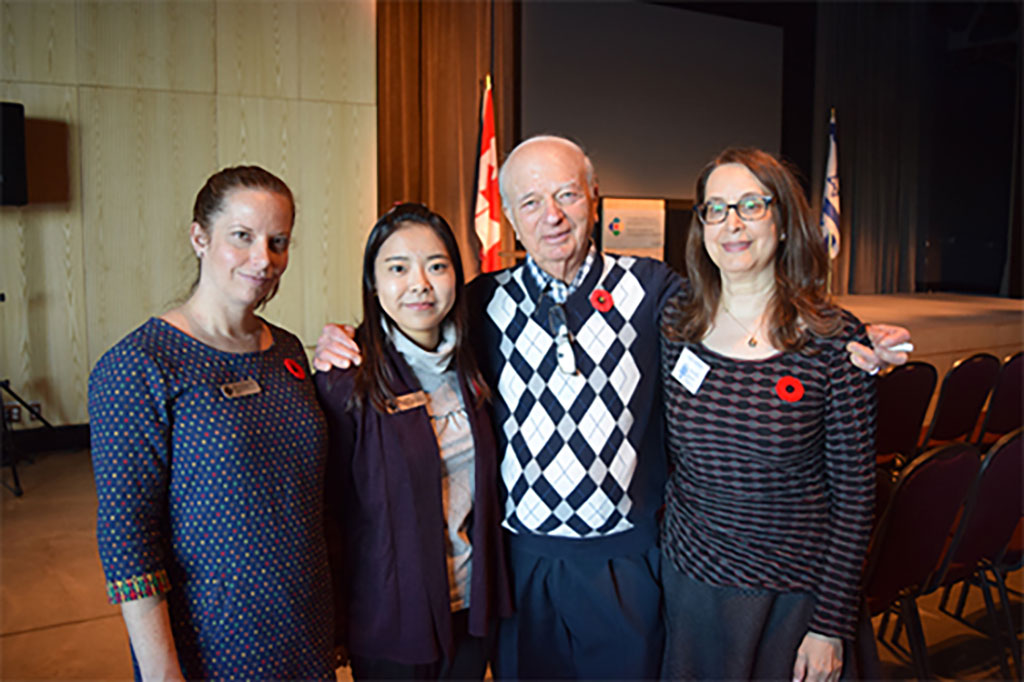To most young people today, the Holocaust is a distant nightmare, something that took place long ago in a place far away. They have heard about the atrocities and the statistics, but Canadian youth, in particular, have largely not been personally affected by this horrific example of humanity at its worst. Books, documentaries, and memorials do go a long way in fostering learning about the Holocaust, but a personal connection is the most effective way of making an emotional impact, instilling empathy, and hopefully ensuring the end of genocide. On the morning of November 9th, 2015, the Canadian Museum of Immigration at Pier 21 and the Atlantic Jewish Council brought that personal connection to Nova Scotian students in the form of Holocaust survivor Sidney Zoltak.
I have never seen a group of 400 Junior High and High School students so quiet. No one talked or messed around, no one applied lip-gloss, no one texted or played games on their phones and tablets. They just sat there, rapt, staring at the 84-year-old man at the podium, listening. His voice was clear and even as he told them a story, his story, of survival against almost insurmountable odds. Partially, it was his kindly and charismatic presence commanding their attention, but mainly it was his story itself, which began when he was young like them. He spoke so eloquently about the things that happened to him and the things he did, both the extraordinary and mundane, that when he laughed they laughed, and when he wiped away a stray tear they did too.
The educational talk on November 9th was the culmination of Holocaust Education Week, an annual event presented by the Atlantic Jewish Council (AJC), that saw Pier 21 partner with the AJC for three unique presentations. Firstly, the film Nicky’s Family was showcased on November 3rd as part of our Diversity Spotlight film series. The documentary tells the story of Sir Nicholas Winton and his personal responsibility for the rescue of 669 children as part of the Kindertransport. In my introduction to the film, the theme of ordinary people doing extraordinary things in the name of what is right, or simply in the name of survival, emerged. That theme continued in my mind throughout the following two events.
The second event held at the museum was the Anniversary of Kristallnacht on Sunday, November 8th. The program began with an explanation of the significance of Kristallnacht (which roughly translates to the Night of Broken Glass) by local student Shael Brown, whose eloquent words set the tone for the rest of the event. Andrew David Terris’ harrowing short film Lullaby, an exploration of the mass murder of Lithuanian Jews set to a hauntingly beautiful poem by Lithuanian Jewish poet Leah Rudnitsky. The poem, called Birds are dreaming on their branches was written following the 1943 mass shooting of 4,000 Jewish men and women in the forest outside Vilnius. Rudnitsky saw a small child wandering the Vilna Ghetto, orphaned by the massacre, and was inspired to write the poem. Leah Rudnitsky would herself perish in a Nazi concentration camp in Estonia less than two years after composing the verse.
Following the film, soprano Janice Jackson performed a selection from local composer Sandy Moore’s upcoming opera Escape to Freedom, which also provided a spotlight for an ordinary person who accomplished extraordinary things, first in the name of doing what is right, and then to ensure her own survival. Her name was Mona Parsons, she was a Nova Scotia woman living in the Netherlands during the Nazi occupation, and she and her Dutch husband were part of the resistance, helping downed Allied airmen escape and return to England. When they were caught, she was jailed but her execution was stayed due to her bravery and refinement. She eventually escaped imprisonment in Germany and returned to the Netherlands then to Canada. Her story of courage, cunning, and honour lay buried for decades, until Historica Canada’s heritage minute about her exploits gave Mona Parsons the recognition she deserved:
Finally, Sidney Zoltak closed the Kristallnacht programme with his own story of courage in the face of great peril, but the hero, as he would make even clearer the following morning, was not him. It was his mother. She, another ordinary person, convinced her husband to cut a hole in the fence surrounding the ghetto in Siemiatycze, Poland so their family could escape into the surrounding woods. He credited her incredible will to survive, and her willingness to do what needed to be done, for his own survival. While they were hidden in the underground bunker of a farmer, she taught Sidney to knit so he could make the collars for the sweaters she knitted, which was the only way for the young teenager to stave off boredom during those long days in the darkness.
When remembering the Holocaust, it is easy to see only the sorrow, the death, and the suffering. And that is valid. But this January 27th, as the world pauses for UN Holocaust Memorial Day, we must remember that hope exists even in the face of evil. We must remember those ordinary people who achieved extraordinary things out of empathy, love, and belief in community. We must remember those who, like Mona Parsons, put their lives at risk for the greater good. We must remember those who, like Nicholas Winton, worked tirelessly to save children imperiled by a regime bent on their annihilation. We must also remember those who, like Sidney Zoltak, survived and flourished when that was a near statistical impossibility.

